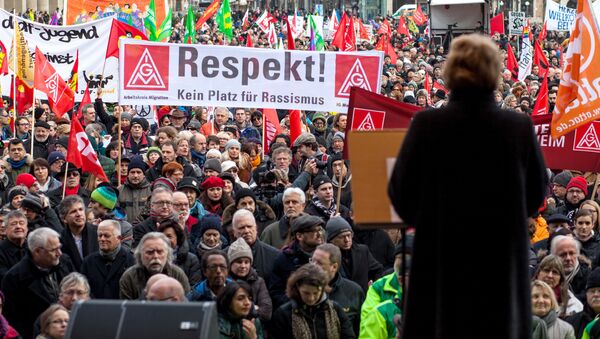The agency — in its annual report published May 30 — summarizes and analyzes major human rights developments in the EU over 2016, with proposals for action covering the EU's Fundamental Rights Charter and its use by Member States, equality and non-discrimination, "racism, xenophobia and related intolerance." It also discusses issues over Roma integration, asylum, borders and migration, privacy and data protection as well as child rights.
FRA publishes Fundamental Rights Report 2017 reviewing major developments in #humanrights in #EU #rightsreport17 https://t.co/Mj7PmOP9gO pic.twitter.com/8nUhHjTaiO
— EU FundamentalRights (@EURightsAgency) May 30, 2017
"We have the laws and the structures to protect human rights in the EU, but we are losing people's trust that they will deliver. We have to give a robust reply to those who challenge the very system of rights protection and demonstrate to people that human rights make a better society for everyone. We need rights to fight the massive inequalities that plague society, such as child poverty and violence against women, and ensure justice for all," said FRA Director Michael O'Flaherty.
"Against a backdrop of mounting intolerance and xenophobic rhetoric, low trust in public institutions, and backsliding in certain aspects of the rule of law, new ways to explain why rights matter to and for everyone must be found," the report states.
The FRA said racist and xenophobic reactions towards refugees, asylum seekers and migrants "persisted" across the European Union in 2016. Muslims experienced growing hostility and intolerance, while discrimination and "anti-Gypsyism" continued to affect many Roma.
"Human rights defenders are the unsung heroes of our society" — Michael O'Flaherty, director of the EU Fundamental Rights Agency #FLDAward pic.twitter.com/2tZcaFjFn9
— Front Line Defenders (@FrontLineHRD) 26 May 2017
During 2016, the European Commission set up a High Level Group on combating racism, xenophobia and other forms of intolerance to support national efforts in this area, as well as to counter hate crime and hate speech. Recurring challenges include various impediments to equality bodies' effectiveness and independence, discriminatory ethnic profiling and a lack of national action plans to fight racism.
"EU member states should ensure that any case of alleged hate crime or hate speech — including those specifically targeting asylum seekers, refugees and migrants — is effectively investigated, prosecuted and tried. This needs to be done in accordance with applicable national provisions and, where relevant, in compliance with the provisions of the EU Framework Decision on Racism and Xenophobia, European and international human rights obligations, as well as [European Court of Human Rights] case law on hate crime and hate speech," the report states.


